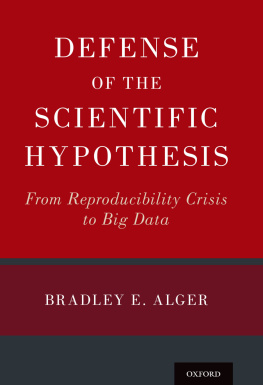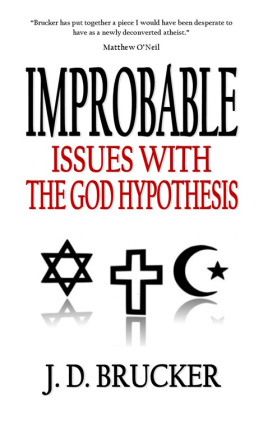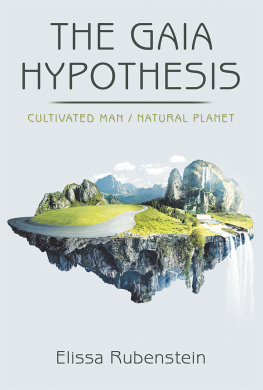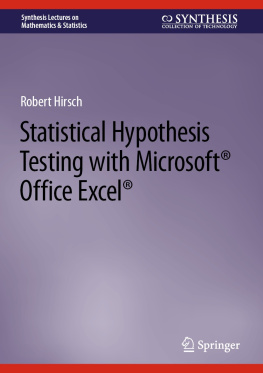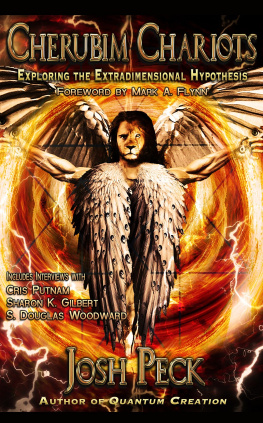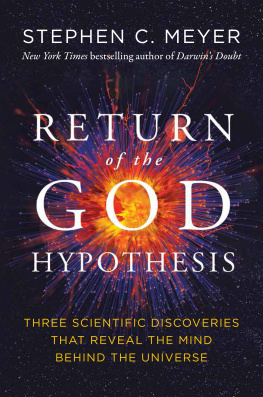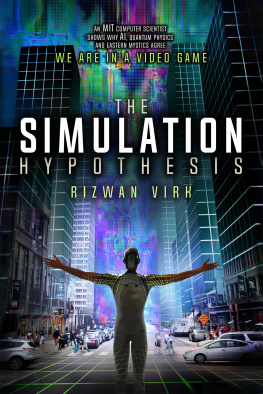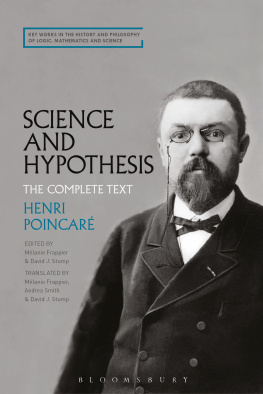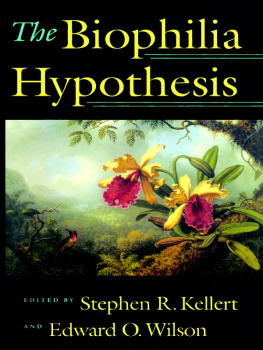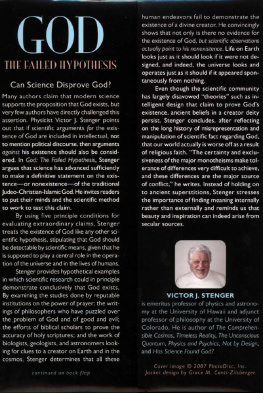Defense of the Scientific Hypothesis

Oxford University Press is a department of the University of Oxford. It furthers the Universitys objective of excellence in research, scholarship, and education by publishing worldwide. Oxford is a registered trade mark of Oxford University Press in the UK and certain other countries.
Published in the United States of America by Oxford University Press
198 Madison Avenue, New York, NY 10016, United States of America.
Oxford University Press 2020
All rights reserved. No part of this publication may be reproduced, stored in a retrieval system, or transmitted, in any form or by any means, without the prior permission in writing of Oxford University Press, or as expressly permitted by law, by license, or under terms agreed with the appropriate reproduction rights organization. Inquiries concerning reproduction outside the scope of the above should be sent to the Rights Department, Oxford University Press, at the address above.
You must not circulate this work in any other form and you must impose this same condition on any acquirer.
Library of Congress Cataloging-in-Publication Data
Names: Alger, Bradley E., author.
Title: Defense of the scientific hypothesis : from reproducibility crisis
to big data / Bradley E. Alger, Ph.D., Professor Emeritus, Department
of Physiology, Program in Neuroscience, University of Maryland
School of Medicine.
Description: New York, NY : Oxford University Press, [2020] |
Includes bibliographical references.
Identifiers: LCCN 2019017418 | ISBN 9780190881481 (hardback) |
ISBN 9780190881498 (updf) | ISBN 9780190881504 (epub)
Subjects: LCSH: ScienceMethodology.
Classification: LCC Q175.A455 2019 | DDC 501dc23
LC record available at https://lccn.loc.gov/2019017418
To my wife Lindsay for her love and support.
Contents
Throughout my career as a research scientist and teacher of graduate students, I was unaware of most of the material in this book. I could have done a better job in the lab and the classroom if Id known more. Bringing together information about the scientific hypothesis, the most versatile thinking tool that a scientist has, is my attempt to make things easier for others.
I thank my friends and colleagues whose many thoughtful comments on drafts of these chapters markedly improved the book. That it is not better is entirely my responsibility. In particular, I thank Iris Lindberg, whose detailed and carefully considered criticisms helped make many chapters more readable and informative than they had been. Discussions with Tom Abrams provided much of the inspiration to undertake the project in the first place, and I am very grateful to him, Asaf Keller, Bruce Krueger, and Paul Shepard for critical comments on several chapters. I thank graduate students Jon Van Ryzin and Sarah Ransom Metzbower for their unique perspectives. Mordy Blaustein, Justine Forrester, Joe Kao, Peg McCarthy, Frank Margolis, Brian Polster, and Scott Thompson read and provided feedback on some of the dreadful early drafts; Im glad were still friends. I benefited greatly from interesting discussions with Tom Abrams, Mordy Blaustein, Soren Bentzen, Tom Blanpied, Joe Kao, Asaf Keller, Bruce Krueger, Brian Polster, Paul Shepard, and Scott Thompson. I thank Bill Hilgartner, Justine Forrester, and Bill Forrester for allowing me access to pre-college textbooks. The folks at the Writing Center at the University of Maryland, Baltimore, offered supportive tips, and Jocelyn Broadwick provided excellent initial editorial input. David Linden gave encouragement and advice on practical matters related to book publishing.
I thank my editor at Oxford, Joan Bossert, for supporting my early efforts as well as the anonymous reviewers whose insightful reading and suggestions were enormously helpful. Special thanks are due to Gerd Gigerenzer for his valuable recommendations and suggestions throughout the project.
I.A Motivation for the Book
Why write a book about the scientific hypothesis? In particular, why a book about defending the hypothesis?
First, most of us, ordinary citizens and scientists alike, do not really know what a hypothesis is and yet it touches nearly every aspect of science. If you want to understand what science is truly about, you cant do better than to understand the hypothesis.
Second, despite its traditional place in science, the hypothesis today is suffering simultaneously from neglect and attacks from critics who will tell you that it is no longer relevant; that, in fact, it is detrimental to science.
The book has two major goals: to explain what a hypothesis is and what it does, and to show why its critics are wrong.
Ordinary citizens and scientists need to be able to evaluate the claims of science about global climate change, the safety of vaccines, the risks of cancer, or any of the many other science-related challenges that keep confronting us. To assess competing claims, we need to know how to distinguish stronger, more solid, and reliable claims from weaker and less reliable ones. The claims that science makes, no matter what theyre called, are hypothesesputative explanations for phenomenaand to be able to assess the claims we need to know how to evaluate hypotheses. It is not difficult to do once you know how. But it is not an obvious or easy thing to do, especially in the face of the criticisms and contradictory information that were bombarded with. The purpose of this book is to make reasoning with and about the hypothesis and understanding science easier.
Why is the book so long? I could use a loose analogy with what the Nobel Prize- winning physicist, Richard Feynman, once said. He claimed that a seemingly simple ideathe atomic hypothesis... that all things are made of atomslittle particles that move around in perpetual motion, attracting each other when they are a little distance apart but repelling when being squeezed into one anothercontains an enormous amount of information about the world,... if just a little imagination and thinking are applied. The hypothesis is a seemingly simple idea that contains an enormous amount of information about science if you just apply a little imagination and thinking to it.
To give your imagination something to work with, I wanted to go into the details of scientific thinking that your teacher never told you about, probably because she had never been taught them herself. What I found was that the subject is a lot deeperand so the book is a lot heavierthan anticipated.
In the beginning, I didnt set out to write a book of any kind, though. Actually, the project was started by a simple question:What is my hypothesis?
Although the graduate student appeared earnest, I wondered at first if she was joking. She was very bright and was well advanced on the research phase of her PhD thesis in a colleagues laboratory. Her project focused on a novel aspect of the neuroscience of rat behavior that might be related to human mental illness. She had done many experiments and gotten masses of high-quality data. Her experiments were focused on specific topics; this was not an open-ended discovery science approach. Surely, I thought, she must have a good idea of why she is doing each experiment, what the likely outcomes are, how the series of experiments hangs togetherin short, an idea of what her hypothesis was? As we discussed her project, it seemed that the different pieces of the investigation were running along in parallel; near each other but not really intersecting.

